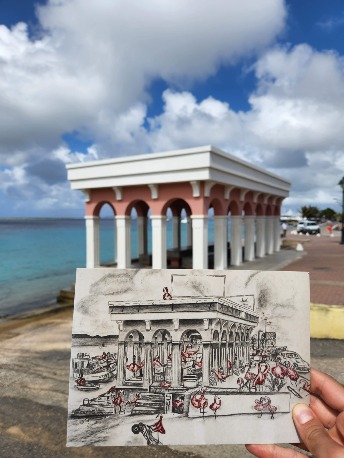Community-Based Tourism on Bonaire - New possible pathways for a more sustainable, resilient and equitable tourism sector

Bonaire is the largest landmass of the Caribbean Netherlands islands, with an area of 288 km² and population of 20,104 (2020). Surrounded by waters that house exquisite coral reefs and marine wildlife, the island has established tourism as its economic backbone. Per the Nature and Environment Policy Plan 2020-2030 (NEPP), “...on average, the direct and indirect added value of tourism to the local economy of Bonaire represents approximately 30% of its GDP, while roughly 23% of employment within the local community is related to tourism” (NEPP, 2020). Whilst a tourism centered economy is not inherently fragile on Bonaire, overconcentration of the economy on established forms of mass recreational tourism along coastal areas and in the capital of Kralendijk, has raised concerns.
Having tourism to be interlaced into all parts of its society, Bonaire now suffers a sequence of events that threatens its ecological sustainability, carrying capacity, and future prosperity with solutions found only in interlocked complication. However, this can be disentangled by empowerment, capacity-building, and resource-based support for bottom-up tourism initiatives from the grassroots community, especially those located in rural Bonaire. This idea is better elaborated through the framework of community-based tourism, an alternative to mass tourism that is found to be detrimental to many. Thus, the research conducted for this report is an exploration on the enabling and the constraining factors affecting the viability of community-based tourism in rural Bonaire which is based on the established theory and practice of successful grassroots community tourism initiatives as points of reference.

This research project emerged as part of a proposal by the Netherlands Enterprise Agency (RVO) of the Ministry of Economic Affairs and Climate Policy, in the framework of research being developed by the Cooperation Dutch Caribbean (CDC) of the RVO. As a joint project, this research is conducted by a team of multidisciplinary research students of the Research Master in Spatial Sciences (Islands and Sustainability) at the University of Groningen, under the supervision of Prof. Billie de Haas and Prof. Louise Meijering.
Utilizing qualitative approach, the data is collected from a fieldwork on Bonaire which included a series of in-depth interviews conducted with purposive sampling. Drawing our findings together into a cohesive framework, we analyze how the different factors interact with each other before determining a series of recommendations on how to mitigate constraining factors, capitalize enabling factors, and empower the vision of the community.
Addressing our research question “what is the viability for community-based tourism initiatives on rural Bonaire?”, we have come to recognize that there is a significant potential for successful CBT, which could lead to better interactions between tourists and the local community, lessen the impact tourism has upon the environment, increase community participation in the industry, and provide tourists experiences that are unique and culturally enriching (Mehmetoglu, 2001). Supporting existing individuals and organizations who are working tirelessly to improve tourism in rural Bonaire, these outlined building blocks can form the foundation of a successful initiative. Government actors can play a key supportive role, through assisting with legal frameworks, administrative needs, long term funding, and other required resources for the included initiatives.


